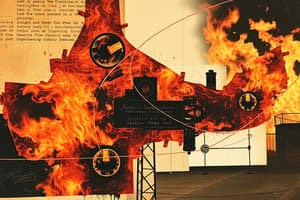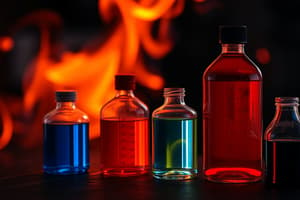Podcast
Questions and Answers
Why is water ineffective for extinguishing fires caused by oil or petrol?
Why is water ineffective for extinguishing fires caused by oil or petrol?
- Water does not have the capacity to absorb heat.
- Water cools the oil, causing it to solidify.
- Water sinks below oil, allowing the fire to continue burning. (correct)
- Water is lighter than oil, causing it to float.
What is the ignition temperature?
What is the ignition temperature?
- The minimum temperature needed to initiate combustion. (correct)
- The maximum temperature a substance can reach before burning.
- The temperature at which a fuel can be stored safely.
- The temperature required to sustain a combustion reaction.
What dangers arise from burning coal in a closed room?
What dangers arise from burning coal in a closed room?
- It produces oxygen, increasing fire risk.
- It creates heat that can ignite nearby materials.
- It releases significant amounts of carbon dioxide.
- It generates carbon monoxide, which can cause suffocation. (correct)
How does respiration relate to combustion?
How does respiration relate to combustion?
Which condition is necessary for any fuel to start burning?
Which condition is necessary for any fuel to start burning?
What is a significant characteristic of complete combustion?
What is a significant characteristic of complete combustion?
What happens if you choose to 'Reject all' regarding cookies and data usage?
What happens if you choose to 'Reject all' regarding cookies and data usage?
What can influence non-personalized content and ads?
What can influence non-personalized content and ads?
Which of the following best describes personalized content and ads?
Which of the following best describes personalized content and ads?
What is a consequence of selecting 'More options' in privacy settings?
What is a consequence of selecting 'More options' in privacy settings?
How does the usage of cookies and data tailor experiences for users?
How does the usage of cookies and data tailor experiences for users?
Flashcards
Why water shouldn't extinguish oil/petrol fires?
Why water shouldn't extinguish oil/petrol fires?
Water is denser than oil and petrol. Poured water sinks below the oil, leaving the oil still in contact with the fire, preventing the fire from being put out.
Ignition temperature
Ignition temperature
The minimum temperature needed for a substance to start burning.
Why not burn coal indoors?
Why not burn coal indoors?
Burning coal indoors produces carbon monoxide, a poisonous gas that reduces blood's oxygen-carrying capacity, leading to suffocation or death.
Respiration as combustion
Respiration as combustion
Signup and view all the flashcards
Complete combustion
Complete combustion
Signup and view all the flashcards
Incomplete combustion
Incomplete combustion
Signup and view all the flashcards
Complete Combustion color of flame?
Complete Combustion color of flame?
Signup and view all the flashcards
Incomplete Combustion color of flame?
Incomplete Combustion color of flame?
Signup and view all the flashcards
What are personalized ads based on?
What are personalized ads based on?
Signup and view all the flashcards
What's the purpose of non-personalized ads?
What's the purpose of non-personalized ads?
Signup and view all the flashcards
What's the impact of rejecting all cookies?
What's the impact of rejecting all cookies?
Signup and view all the flashcards
What does 'Accept all' mean for cookies?
What does 'Accept all' mean for cookies?
Signup and view all the flashcards
What does 'More options' provide?
What does 'More options' provide?
Signup and view all the flashcards
Study Notes
Combustion and Flame
- Water and Fire: Water is not effective for putting out oil or petrol fires because water is denser than these liquids, causing it to sink below and not extinguish the fire.
- Ignition Temperature: A fuel requires a minimum temperature, its ignition temperature, to begin burning. Once reached, combustion becomes self-sustaining.
- Burning Coal Indoors: Burning coal indoors is dangerous because it produces carbon monoxide, a toxic gas. Carbon monoxide binds to hemoglobin, reducing oxygen transport and leading to suffocation and death.
- Respiration as Combustion: Respiration is a type of slow combustion. Food is oxidized (combusts in a slower, controlled process) in the presence of oxygen to release energy.
Complete vs. Incomplete Combustion
- Complete Combustion: Complete combustion occurs with sufficient oxygen, resulting in a bluish flame and no smoke.
- Incomplete Combustion: Incomplete combustion occurs with insufficient oxygen, producing a yellow flame and smoke containing soot particles.
Studying That Suits You
Use AI to generate personalized quizzes and flashcards to suit your learning preferences.




